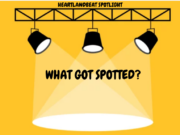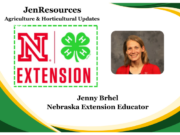Coming Events
Jan. 14, 2015, Crop Production Clinic, 8:45 a.m., Holthus Convention Center, 3130 Holen Ave., York
Jan. 14, 2015, Farm Bill and Texas A&M Computer Training, 9:00 a.m., Innovation Campus, Lincoln
Jan. 15, 2015, Farm & Ranch Succession & Estate Planning Workshop, 9:00 a.m., York Country Club,
Feb. 2, 2015, Pesticide Applicator Certification Training, 1:30 p.m., 4-H Building, York
Feb. 23, 2015, Pesticide Applicator Certification Training, 1:30 p.m., 4-H Building, York
March 12, 2015, Chemigation Training, 1:00 p.m., 4-H Building, York
March 12, 2015, Pesticide Applicator Certification Training, 6:30 p.m., 4-H Building, York
Happy Holidays
I hope you all have a chance to enjoy your families and a little time off the next couple of weeks! Looks like we’re getting in to a busy time for educational events and meetings.
Crop Production Clinics Planned
It’s hard to believe, but it’s again that time of the year four our annual Crop Production Clinic across Nebraska. Our Clinic will be Wednesday January 14th starting at 8:45 a.m. at the new Holthus Convention Center here in York. We’ll have two sessions going at the same time that you can select from. They have a great program planned, topics include: pesticide safety, water management, crop production, agribusiness management, the farm bill and soil fertility. Check our the program that follows:
Pest Management & Pesticide Safety Section
9:00Â Â Â Â Pesticide & Environmental Safety I
Pesticide Laws and Regulations
New Insecticide Modes of Action
Pesticide Health and Safety
10:00Â Â Pesticide & Environmental Safety II
Weather Variability and Disease Management Strategies
Environmental Safety and Pesticides
Weed Science Questionnaires
11:00  What’s New in Pest Management
What’s New in Plant Pathology
What’s New in Weed Science
What’s New in Entomology; Bt Corn Traits
12:45Â Â Disease Management
Corn Disease Update
Charcoal Rot: An Important Disease in 2014
Soybean Disease Update
1:45Â Â Â Â New Issues in Insect Management
WCR Resistance Update
Plant Resistance to Insects
2:45Â Â Â Â Weed Resistance and Management
Herbicide-resistant weeds update and management options in Nebraska
Â
Soil, Water & Crop Management Section
9:00 Â Â Â Water Management
UNL Irrigation Apps
Checkup for Pivot Efficiency
10:00Â Â Crop Production
In-Season Corn Yield Forecasting Using a Computer Simulation Model
Pest-Resistant Crops: A Perspective from Game Theory
11:00 Â Agribusiness Management and Marketing
2014 Farm Bill
12:45Â Â Soil Fertility
Nutrient Management Update
N Loss Tool
Active Sensors
Agribusiness Management and Marketing
Land Lease Update
Controlling Crop Input Costs
2:45Â Â Â Â Crop Production
On-Farm Research: Reliable Data to Drive Decisions
Use of Climate Information for Agricultural Decisions
Cover Crops: What We Know and Don’t Know
It’s important to pre-registration by 3 p.m. January 13! Cost is $65 which includes:
- 2015 Guide for Weed Management in Nebraska
- 2015 CPC Proceedings
- Noon meal & refreshments
Go to http://agronomy.unl.edu/cpc to register. I hope you’ll plan to attend.
Farm Bill Education Training
As a result of Randy Pryor’s (Extension Educator in Saline County) efforts, Texas A&M Agricultural Food Policy Center and Nebraska Extension are teaming up for a comprehensive Farm Bill Decision Aid computer workshop. This hands-on training will be held Wednesday, January 14, 2015 at the new Nebraska Innovation Campus Conference Center, 2021 Transformation Drive in Lincoln, Nebraska.
As those of you that attended our Farm Bill Meeting at the Cornerstone Event Center on December 9th, the 2014 Farm Bill Commodity provisions are complex. The nationally recognized Ag Economists Dr. James Richardson, Texas A&M and Dr. Brad Lubben, UNL will lead the training. Dr. Richardson is the author of new, cutting edge, computer decision tool, endorsed by USDA. Attendees will learn how to use the Texas A&M Computer Decision Aid, how to interpret the results and how managing risk is integrated into the model. Participants are encouraged to bring their own iPad, tablet or laptop computer.
Online pre-registration is open until Wednesday, January 7, 2015. Participants need to pre-register at http://go.unl.edu/farmbill.
The Texas A&M web based, software tool is intended for educational use and the insurance tool features will work through the 2018 crop year. The output uses 500 pseudo random possibilities and involves statistical probability analysis of future outcomes. A new crop insurance tool integrated into the decision aid model will be of interest to all users and especially insurance agents.
The workshop will be from 9:00 a.m. to 4:00 p.m. with morning registration and refreshments available starting at 8:15 a.m. at the new NIC auditorium. There is a $30.00 registration fee which includes the noon meal, refreshments and meeting materials.
For more information go to: http://saline.unl.edu/nebraska-farm-bill-texas-a-m-computer-training. I hope you’ll have an opportunity to attend. Let me know if you have questions about this training.
Farm & Ranch Business Succession & Estate Planning Workshop
Two years ago we held a Farm/Ranch Business Succession & Estate Planning workshop to a full house, so we’re planning to host it again January 15, 2015 at the York Country Club. The workshop will go from 9:00 a.m. to 2:30 p.m.
The workshop is intended to be useful for established farm and ranch owners, for their successors, and for beginners. Topics include: the stages of succession planning, contribution & compensation, balancing the interests of on-farm and off-farm heirs; the importance of communication, setting goals, analyzing cash flow, and balancing intergenerational expectations and needs; beginning farmer loan and tax credit programs; the use of trusts, wills, life estate deeds and business entities (such as the limited liability company) in family estate and business succession planning; buy-sell agreements, asset protection, taxation (federal transfer taxes, Nebraska inheritance tax, basis adjustment), and essential estate documents.
Presenters are Dave Goeller, Deputy Director, Northeast Center for Risk Management Education at UNL and Joe Hawbaker, Agricultural Law attorney from Omaha.
There is no charge for the workshops. To register call the Rural Response Hotline at 1-800-464-0258. Register by January 12, 2015.
This workshop is made possible by the Nebraska Network for Beginning Farmers & Ranchers, the Farm and Ranch Project of Legal Aid of Nebraska, National Institute of Food and Agriculture, the Nebraska Department of Agriculture’s Farm Mediation, and the University of Nebraska Extension.
Thanks to the Chamber Ag Committee, a free lunch will be provided as part of the workshop. The sponsors are: Cornerstone Bank, Henderson State Bank, Midwest Bank and York State Bank.
More information s posted at: http://york.unl.edu/crops-future, or give me a call at 402-362-5508 or email me at gary.zoubek@unl.edu.
Pesticide & Chemigation Certification
It will soon be the 1st of the year and that’s when we receive questions about private application pesticide certification as well as chemigation certification. This past week we set the dates for these trainings in York and the surrounding counties. The York dates are in my list of coming events. We’ve mailed information to those who’s certification expires in the coming year.
It’s important that you check your certification in case it’s expired, because we won’t send you a reminder if you’re past due. If these dates don’t work, you can check the private applicator training dates at: http://pested.unl.edu/private-license and the chemigation training dates at: http://go.unl.edu/deqchemigation.
York Extension Centennial Notes
In 1951, there were 514 York County 4-H members.
Soybeans have been tried the last 5 years, but no grower has stuck with them, but it appears that some will. The Agent felt we need soybeans. The 10th Annual Irrigation meeting was held in York at the City Auditorium with 700 people attending. It started out as a county meeting, but has grown to a regional one.
A goal of eliminating 50 of the so-called blind corners was suggested as a project for women’s project clubs, 4-H clubs and FFA clubs. The traveling public appreciates seeing the number of blind corners being eliminated.
In 1952, one of the larger fund raiser for the 4-H Committee was serving the Feeders & Breeders banquet with 750 plates served. It netted $300.08. The food and popstands had a profit of $532.08. Approximately 120 women & youth worked in the two stands during fair week. There were 537 4-H members.
Forty people attended a corn drying tour in the middle of December that stopped at five locations. Corn production efforts centered on corn rootworm control. Approximately 50,000 acres of corn were sprayed with benzehhexochloride in April and May. Six calls were made to farms related to down corn in July. These producers had not sprayed. Drying of wet corn was the topic of several workshops. Producers shared their figures and costs ranged from 6-11 cents/bushel.
The first corn picker clinic held in Nebraska was held October 2, 1952 in York. It was sponsored by the Farm Safety Committee. As it was being planned everyone was sure that farmers wouldn’t be interested, but 225 turned out and it taxed the seating capacity of the building as well as lunch facilities.
The Beaver township Safety Committee held an all day meeting for the purpose of eliminating blind corners. Forty-six attended and helped eliminate 16 corners that day. Fifteen men came back 2 ½ days and eliminated 11 more for a total of 27. (Five people had been killed in York County at blind corners in the previous 10 months.)
In 1953 corn rootworm damage to corn was very severe in spite of the big campaign put on to get corn ground treated for the pest. Counts varied from less than 20 per plant up to as high as 75. 1,000 acres were treated for adult beetles. It’s estimated that 50,000 acres of ground had BHC applied this past year (benzenehexachloride).
Seven hundred seventy four people attended the Feeders & Breeders Banquet served by 100 4-H family members. Proceeds of 50 cents/plate again went to 4-H Committee for 4-H Building improvements.
The limiting factor in producing plenty of crops in York County is lack of adequate rainfall. It is possible to get a deep well irrigation system for the cost of approximately $5,000; much less than what the income from additional production will be. 80 acres can be irrigated with the well. Yields will double or triple in dry years. You cannot purchase 80 acres for less than $12,000 to $16,000. For that reason, the attempt to be made to get 500 wells in the county by 1960. We currently have 225 irrigation wells in York County.
A corn picking contest was held October 15 and attended by between 6,000-7,000 people.
In 1954, the third annual Farmers-Businessmen’s picnic was held on August 24 with 1,100 people attending.
In 1955 200 additional irrigation wells were installed. It was a dry year and the 350 irrigated farms fared better because of the ability to supply supplemental water.  Five of the 13 high corn yield plots attained over 100 bushels/acre. A goal was made to have all famers base fertilizer programs on soil test analysis. 75 farmers submitted soil tests and 1,200 farmers attended three countywide meetings. 1,300 attended irrigation tours and meetings.
It was recommended that farmers attempt to drill their wells at least 1,000 feet apart to avoid competition for water during the peak of irrigation season. An irrigation specialist demonstrated the use of a soil probe to determine timing of irrigation according to subsoil moisture reserves.
During the annual irrigation tour, a grower was seeding rye between corn rows with the idea of providing full pasture for stock cattle. It was not successful because of the shade the corn provided.  It retarded the rye.  A highlight of the tour was the syphon tube setting contest.


































